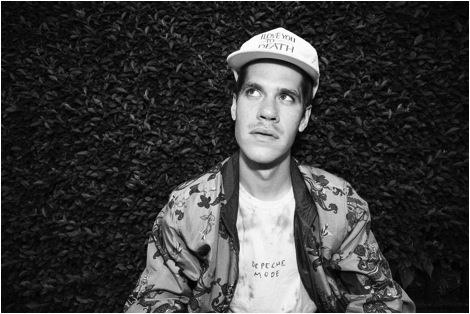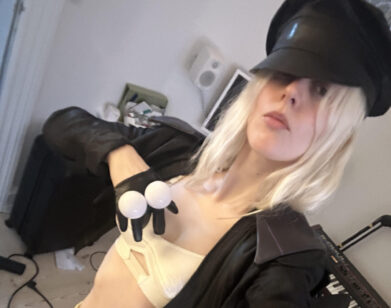Paris and Porches.

ABOVE: AARON MAINE
While listening to Porches.’ last full-length album, last year’s Slow Dance in the Cosmos, you’re thrust into what feels like a 10-act drama. Characters named Franklin and Ronnie Mystery navigate the trenches of casual sex, Xanax, sacrifice, insecurity, dive bars, and Jesus with the moral deshabille of a Generation Y romantic. Each scene plots across an enigmatic “city,” which— revealed by the song “Skinny Trees”—eventually turns out to be New York. And even though there’s no explicit conclusion, the album ends with what feels like an epilogue of soft resistance, when the narrator decides to combat the encroaching tragedies of youth by getting “spaced out” and claiming he will live forever in “The Cosmos.”
Where traditional songwriters write sad songs about their struggles with loneliness, Maine writes slow songs about characters in the pursuit of happiness. But that uniqueness is only part of the reason why Porches. has amassed a national cult following in its four years of existence. What truly elevates Maine’s music above the common crop of maudlin guitar poets is the dramatic power of his voice. In songs like Slow Dance opener “Headsgiving,” he stumbles from falsetto high to crooner low with the emotive pathos of a drunk, yet his delivery is never less than pitch-perfect. He’s a natural vocalist, and as his voice explores different spectrums of volume, texture, and tone, it creates a temperamental performance that mirrors the many wild tracts of human emotion.
Earlier this month, Maine released a split tape with Tuareg songwriter Mdou Moctar, under the moniker Ronald Paris. Paris’ side of the tape feels like a stark departure from Porches.’ Slow Dance, both in production and atmosphere, but only if you make the faulty assumption that his Porches. work is Maine’s primary port of call. As we learned over the course of this interview, Maine has no primary port of call. He may release more albums beneath the Porches. title than others, but each of Maine’s characters are spirited by the same personal trials, artistic desires, and urban existentialism as their creator.
We spoke to Maine preceding his May 17 show, at Shea Stadium in Brooklyn, to find out how Porches. started, where Ronald Paris came from, and what separates his characters from himself.
JOHNNY MAGDALENO: How did Porches. begin?
AARON MAINE: Porches. was the second band I was in. The first band was called Aaron Maine and the Reilly Brothers, which eventually became Spaceghost Cowboys. After going on the first Spaceghost Cowboys tour—I think it was in 2011—I came home and everyone ended up spreading out pretty far. Then I started to write new songs on a keyboard and they sounded different enough to spark a new project. I recorded that first EP (2010’s Summer of Ten) and released it before putting together a band or performing, just to get it out there. It was received well, and I guess that’s when I started to take it a bit more seriously.
MAGDALENO: So Aaron Maine and the Reilly Brothers turned into Spaceghost Cowboys, and from there, Porches. was the next iteration?
MAINE: Yeah. I don’t think we played a Spaceghost Cowboys show after our first tour. It just petered out.
MAGDALENO: And on your recent split tape with Mdou Moctar, you released music under the name Ronald Paris.
MAINE: Yeah, pronounced Ronald Par-eeh. It’s like P-A-R-E-E-H.
MAGDALENO: Ronald Par-eeh. Okay.
MAINE: Yeah, Ronald Paris was a newer persona. I used it to separate me from Porches., but not too far, you know. Ronald Paris is like its own character, but it’s very closely related to Porches..
MAGDALENO: Would you say that, right now, you’re facilitating three different personas? Aaron Maine, Porches., and Ronald Paris? Or are there more?
MAINE: Yeah, that’s it. There are three. Porches. and Ronald Paris are kinda similar, but I feel a bit more similar to Ronald Paris at this point.
MAGDALENO: Are you speaking with or through these personas?
MAINE: I would say through. Ronald Paris is—I try and make art through him. Ronald Paris is like a projection of who I want to be. And through that persona I can kind of create art that’s based off Ronald Paris’ art, and his interests, and his tastes.
MAGDALENO: Which of those three would you rather play in a movie?
MAINE: [laughs] I think Ronald Paris would be an interesting character.
MAGDALENO: What would that movie be about?
MAINE: I think it would be set in Santa Fe, New Mexico. And Ronald Paris would just be a man about town.
MAGDALENO: Why Santa Fe?
MAINE: I spent six months down there when I was 20 years old…
MAGDALENO: Sorry, how old are you now?
MAINE: I’m 25.
MAGDALENO: Okay.
MAINE: Yeah, so I stayed with my aunt and uncle when I moved out there. I stayed in their garage when I took some time off of school, to collect my thoughts. It was a magical place, I had a really incredible time. I miss it, though, I haven’t been back since. It’s a very calm place.
MAGDALENO: Would Ronald Paris have a more simple life there than the one you have now?
MAINE: No. I kind of see Ronald Paris as being on the eccentric side of personalities. I think there’s a weird twinge of idolization with Ronald Paris, where he’s not quite where he wants to be but he lives this lifestyle in which he tries to live close to it. I think the name reflects that though. It’s like fake fancy, you know. It’s that idea. A little out of place but in a good way.
MAGDALENO: What separates Ronald Paris from Aaron Maine?
MAINE: I think it’s nice to not make art under my own name. I think it opens things up. It’s not that people don’t know that I’m the one—that Aaron Maine is the author. But mentally it opens up a different sort of creativity. You can remove yourself from what you’re used to making and look at it from a different lens, almost.
Most importantly, Ronald Paris acts as a clean slate for me. He’s a friend of mine, and he has no past. He’s like a new notebook. I can project onto him whatever I want to because it’s an extension of me, where I can create a body of work unrelated to what I have made in the past. But it’s not like he’s a fictional character either. He’s a version of me, a new channel for me to make art through, and a friend of yours.
MAGDALENO: Ronald Paris’ sound is obviously different from Porches..
MAINE: Yeah, definitely.
MAGDALENO: Which came first—the songs on that split tape or the name Ronald Paris?
MAINE: I don’t remember, really. They definitely informed each other.
MAGDALENO: How is Paris connected with your life in Manhattan?
MAINE: Living in Manhattan is this huge thing for me, which has deeply affected how I think about a lot of things, especially music and art. My tastes seem to have changed pretty quickly, since I’ve come here. Ronald Paris was, I could say, born out of moving to Manhattan.
MAGDALENO: When did that happen?
MAINE: That happened two years ago. Me and my girlfriend moved in to our place here.
MAGDALENO: How has Manhattan changed you and your outlook on art?
MAINE: I’m very inspired by the people I see on the street, the clothes that they wear, the music I’m surrounded by—everything I have more access to now. I’m extremely impressionable when it comes to my surroundings, and I try to soak it all up. There’s so much to soak up, so much that’s constantly informing me. Just listening to more music, seeing more people, more clothes, more shoes, more hairstyles.
MAGDALENO: So there’s a lot more input compared to where you lived before.
MAINE: Yeah, definitely a lot more.
MAGDALENO: You live there with your girlfriend, Greta Kline, who plays music as Frankie Cosmos?
MAINE: Yeah.
MAGDALENO: You guys have been pretty public about your relationship, on a surface level.
MAINE: Yeah, I guess so.
MAGDALENO: Is that a conscious decision? Or does it come up often simply because you guys are a part of each other’s lives?
MAINE: I don’t understand the question.
MAGDALENO: Is it a conscious decision to publicize the fact that you guys are a couple? I’ve seen session videos where she makes appearances, and there have been interviews specifically addressing you two as a couple.
MAINE: Right.
MAGDALENO: Is that something you guys pursue?
MAINE: I wouldn’t say we pursue it. With the videos and the songwriting, that kind of collaborating and sharing of ideas is natural because we’re both making art and sharing ideas together. So no, it’s not a conscious decision to publicize it. With interviews, for whatever reason, it just seems to be a point that’s brought up often, and I guess we’ll talk about it if someone asks us about it. But we’re not trying to play it up or anything.
MAGDALENO: Does the fact that you’re in an intimate relationship affect how honest you both can be in your songwriting?
MAINE: We try to not let that affect our songwriting as much as possible. We both agree it’s more important for our creative processes to not let our emotions as a couple interfere.
MAGDALENO: A lot of characters in your songs see their worth in context of another person, usually a romantic partner. And then you have the song “Being Alone,” where you repeat “I’m no good at being alone” a few times in each chorus. Do you think happiness depends on companionship?
MAINE: I think a lot of happiness does depend on companionship. But it goes both ways. [laughs] That’s a hard one to answer. I believe in love, if that’s an answer. For sure.
MAGDALENO: Would you say your music has a cult following?
MAINE: I think so. We’ve been at it for a while, and it feels like a part of our very slow climb. There are a lot of people that appreciate us and have come out to a lot of our shows, and keep coming out.
MAGDALENO: Why do you think your music has a cult following?
MAINE: I don’t really know why. I don’t know why it has a cult following, and I don’t know why it hasn’t “buzzed” more and, like, blown up. It’s confusing to me. I mean, I’m totally happy with the following, I just don’t know why people are drawn to it in that sort of way. I’m not sure.
MAGDALENO: Let me phrase that in a completely different way. What do you like to see in a project that’s driven by a singer-songwriter?
MAINE: I pay attention to all aspects—I look for lyrics, if that’s what they want you to focus on. If not, then the production, or the composition, or their aesthetic. I’m interested by it all. It just depends on who we’re talking about.
MAGDALENO: On a final note, what’s next for Porches.?
MAINE: I’m still writing a lot, been writing a lot since the last album. And this summer, we’re gonna be working out some of the new songs as a band. We don’t have many shows lined up, and we’re going to try and hunker down and rehearse as much as we can. Depending on when the songs are ready, I’m probably gonna try to get in the studio, hopefully late fall, maybe through the winter time, and bang out the next record.
MAGDALENO: Is most of that written now?
MAINE: Hard to say. I have about 20 new songs, and I’m going to keep writing probably through the recording process, but we’ll see. There’s a handful I’m pretty set on, being on the next record. But a lot of it depends on what happens this summer.
RONALD PARIS WILL PLAY TOMORROW, MAY 17, AT SHEA STADIUM. FOR MORE ON THE ARTIST, PLEASE VISIT HIS BANDCAMP.






